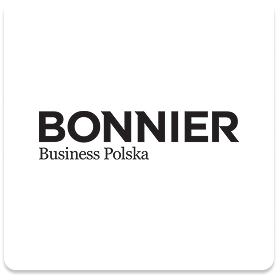About the customer
The tradition of Bonnier brand started over 200 years ago – as a small family bookshop set up in 1804. Today, Bonnier Business Group is a media enterprise composed of 175 companies that together employ over 11,000 people in 16 countries. Polish branch has offices in a few cities in Poland, so fluent remote cooperation is essential for its success.
Bonnier Business Poland is one of the biggest media group from the finance and economy sector. It’s aspiring to be the first source of information for Polish entrepreneurs and investors. To position itself as a leader in this specific niche, the company is conquering three key areas: press, news portals and business events. They publish 4 specialistic periodical journals, run 13 business-related web services and organize events that gather the most influential Polish entrepreneurs.
Bonnier Business Polska in numbers:
- Over 400 employees
- 20 years on the Polish market
- 50 million visitors per month
- 4 million users per month
The challenge
Bonnier is a multi-brand company. Previously, each employee had an e-mail address with one main domain (the one belonging to the brand he co-creates). Different brands within the company (bankier.pl, pb.pl, and pulsmedycyny.pl) had completely different email systems. This solution also did not support receiving e-mail on mobile phones – add-ons, such as an email client or a mobile application, were expensive.
The organization of meetings was based on the schedules of rooms to which several people had access. The process of preparing the meetings required a lot of time and attention.
The duties of publishers, journalists, and editors mainly consist of working with text documents. Traditional office software was limiting the possibilities of transferring and collaborating on files. Employees stored files on local servers. Working from home required a VPN solution that could connect the employee to resources in the office.
The email that the company used previously required frequent updates, keeping an eye on anti-spam, anti-virus systems, and server performance. Ultimately, this work took up a lot of valuable time from those in charge of the administration.
Most of the employees welcomed Google Workspace with opened arms as an expected change for the better. We’ve dispersed the doubts of the rest by providing them with practical training.
The solution
The choice of Google Workspace ensured access to mobile apps with business accounts to all employees – no matter what kind of operating system or the device they’re using, field reporters and office workers have equal access to information.
Comprehensive migration of all the data took about three months due to the need for an advanced configuration of a few domains of this country-wide company. Also, migration from the old system proved to be more tricky than anticipated. Luckily, all went well thanks to joined forces of Bonnier IT department and cloud specialists from FOTC.
I have nothing to complain about – consulting and implementation service was impeccable. Mateusz Duiwe was recommended to me by Google in Ireland as a person who can help me with the migration, so he was a key frontman of changes – we really appreciate his professional approach to the job.
Results
Google Workspace has made it easier for employees to organize meetings and videoconferences. Google Calendar made booking conference rooms hassle-free, because admin listed all the rooms as resources – from that point, every employee could see and book a date from their desktop or mobile app, and invite other participants via automatic email notifications. Bonnier also has several locations in Poland, so the Google Meet application turned out to be an invaluable help in daily communication.
Gmail has guaranteed all employees of the company access to work email on any mobile device, thanks to a convenient, free mobile application available on any operating system.
Google Docs – the text editor app included in Google Workspace proved to be a perfect tool for work in a media group company. Publishers, journalists, and editors gained constant access to their files from any place in the world, and they can now easily share them. Real-time cooperation in files became a daily practice at Bonnier. Suggestions, comments, advanced editing options, and wide availability of this tool are appreciated not only by creative departments but also by technical ones. E.g. IT department uses Docs to create clear reports for the management. The whole company achieved a new standard of convenient cooperation, and now they declare that they couldn’t live without it.
Bonnier Business Polska abandoned local office productivity tools and communicators from outside Google Workspace. Docs are the leading text editor, Google Meet is the main communication tool, and Calendar keeps all the schedules in check – it completely replaced archaic paper planners, which made Bonnier not only more productive, but also more eco-friendly. A few employees still use other software individually, but Google Workspace became a default option.
With Google Workspace, managing user accounts is very easy. There are fewer administrative tasks, and one person is able to take care of the entire instance. The IT department in Bonnier does not have to worry about taking care of the servers, because the reliability of the entire infrastructure is provided by Google. The entire company has one instance of Google Workspace for easy management, but most employees have multiple aliases. Thanks to this, it does not matter whether someone writes to the domain @pb.pl, @bankier.pl, or @bonnier.pl – the message will reach the right person anyway.

